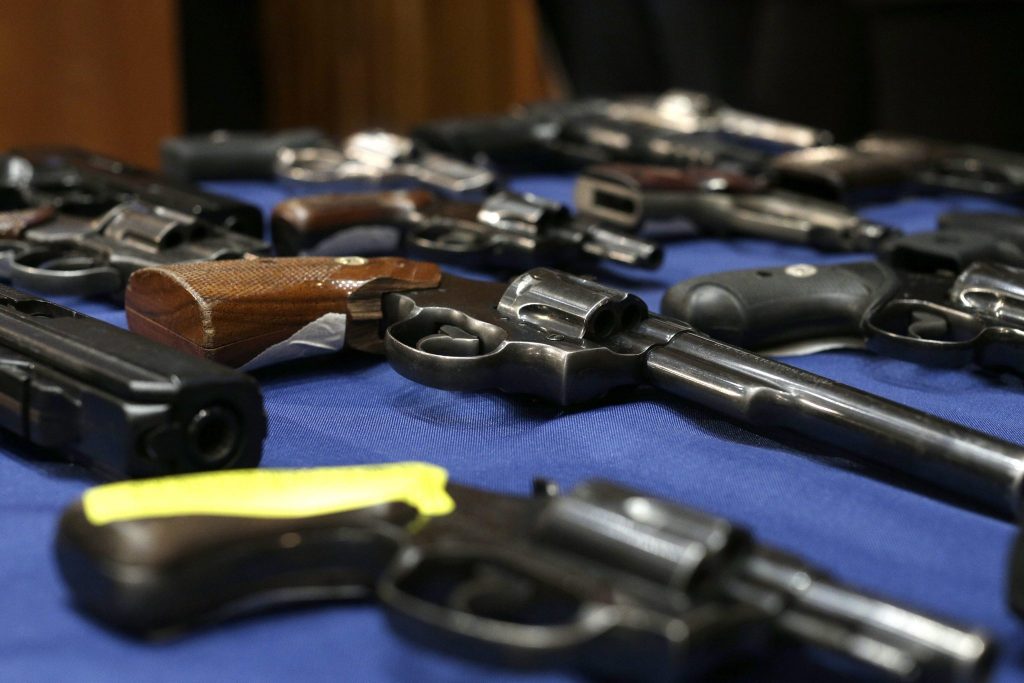EPA photo
By
Ricardo Swire
Last week the world waited with bated breath as Americans voted in a history making fifty-eighth quadrennial presidential election. Concurrently US based traffickers relentlessly tested Haitian Customs and Judicial authorities’ detection capabilities. Shipping firearms violates US laws, especially one that specifically bans gun exports to the destabilized Caribbean nation.
Haiti’s internal security mechanism seized the third unauthorized weapons cache, dispatched from America within eight weeks. The first domestic law enforcement intercept occurred on September 8, at the Port of Saint-Marc in western Haiti. A maritime trip from Florida to Haiti, via the Bahamas, customarily charts a course across 917.8 nautical miles of ocean.
Firearms follow a complex path, from original point of sale to underground markets, 2015 US Federal data logging approximately fifty thousand guns diverted by criminal elements across US state lines every year. Interstate 95 and connected Virginia, Georgia and Florida highways are collectively part of the “Iron Pipeline.” On Saturday April 16 a multi-agency law enforcement team stationed at Miami International Airport made a fortuitous discovery.
The Homeland Security Investigations (HSI) Special Agent and US Customs & Border Protection (CBP) officers opened a shipment of car battery cases, dispatched from Maracaibo, Venezuela. The consignment was addressed to a resident in the 3800 block of Southwest 132nd Avenue, a district near Florida’s Turnpike intersection and Bird Road in West Kendall. Some battery cases showed signs of recently applied glue. The law enforcement interceptors found modified compartments that concealed eight handguns, approximately 23, 500 rounds of ammunition and 19 high capacity magazines.
Reports inform that Interstate 75, which runs parallel to Interstate 95, funnels illegal firearms to Detroit from Ohio, Kentucky and Tennessee, Phoenix based traffickers smuggling guns along Interstate10. Las Vegas’ illegal weaponry moves along Interstate15, Reno’s by Interstate 80. Traffickers in both Washington and Oregon transport their guns along Interstate 5 while Maine and New Hampshire send firearms to Boston the capital of Massachusetts. Portland Maine is approximately two hours away, 108 miles along Interstate 95.
The 8th November Haitian firearms discovery was transported in a shipping container from Florida, delivered to Global Port Lafito. a landing point twenty-five minutes north of Port-au-Prince. Port Lafito is a Haitian infrastructural development project operational from March 2015. Landed illegal ordnance included seven Smith & Wesson multi caliber pistols with fifteen matching magazines. Five Glock model .40 semi-automatic pistols, twenty-seven fitting magazines and in excess of four hundred .40 cartridges. Slightly less than one thousand 9 mm bullets. Two generic magazines, compatible with assault rifles, all among the shipment.
A 2013 US Bureau of Alcohol, Tobacco, Firearms & Explosive (ATF) investigation report noted in January that year a thirty-two year old male Haitian Florida resident applied to purchase six Glock pistols from Oakridge Gun Range, South Orange Avenue in Orlando, Florida. On January 28th 2013 the Haitian US resident paid for the firearms and collected. ATF agents immediately intercepted and arrested the Haitian US resident known as “Kenson Elise.”
Law enforcement officials discovered that on other occasions the Haitian Florida resident purchased guns from Universal Weapons, located on South Orange Blossom Trail, Orlando. He also bought six multi-brand semi-automatic pistols from Southern Oaks Gun & Pawn also in Orlando, Florida. Without acquisition of a requisite export license, the trafficker used multiple shipping companies to dispatch the guns. Shipments were hidden aboard cargo vessels traveling from Florida to Haiti.
Firearm arrivals were communicated to Kenson Elise, who traveled to Haiti by commercial airlines to personally collect. The ATF report noted he confessed that illegal guns were mainly sold to Haitian National Police officers. Previous ATF calculations assigned twenty-five percent of guns trafficking, processed by its Miami office, as firearms exported to Haiti. The Caribbean country considered top foreign destination for South Florida firearms export.
One trafficking exemplar catalogued a forty year old male Haitian US permanent resident with documented addresses in Pompano Beach, Broward County and New York, who purchased twenty-nine guns in South Florida. Among his procurement were twelve gauge shotguns and assorted semi-automatic pistols smuggled to Haiti. The gun trafficker traveled to Haiti twenty-two times by commercial flights, after receiving notification his unauthorized consignments arrived.
Deceptive means, such as hiding the guns in packages of dog food to throw off port security K9 searches, were engaged. He continued to illegally export firearms even after receiving an official warning that it was not permissible under American law. Condemning evidence was corroborated by the trafficker’s BlackBerry smartphone data in possession of Haitian National Police. Orlando based traffickers are tied to the US Caribbean island state Puerto Rico’s (PR) crime gangs. Members send guns via the postal services, FedEx couriers or encased in vehicles manifested as ship’s cargo.
Innovative mediums conceptionalized to defeat active law enforcement detection protocols. Established trafficking patterns show US based gun smugglers stockpile best-selling firearms. Consignments are shipped on water routes to Port-au-Prince inside electronic equipment, consumer items, sewn in garments’ lining, or placed in the cargo hulls of freighters sailing the Miami River. Intelligence reports suggest that a Lorcin 9mm handgun, valued US$150, is sold in Haitian communities for US$500. The trendy Glock pistol priced US$400, cost US$1,500 on Port-au-Prince streets.



No Comments Yet!
You can be first to comment this post!